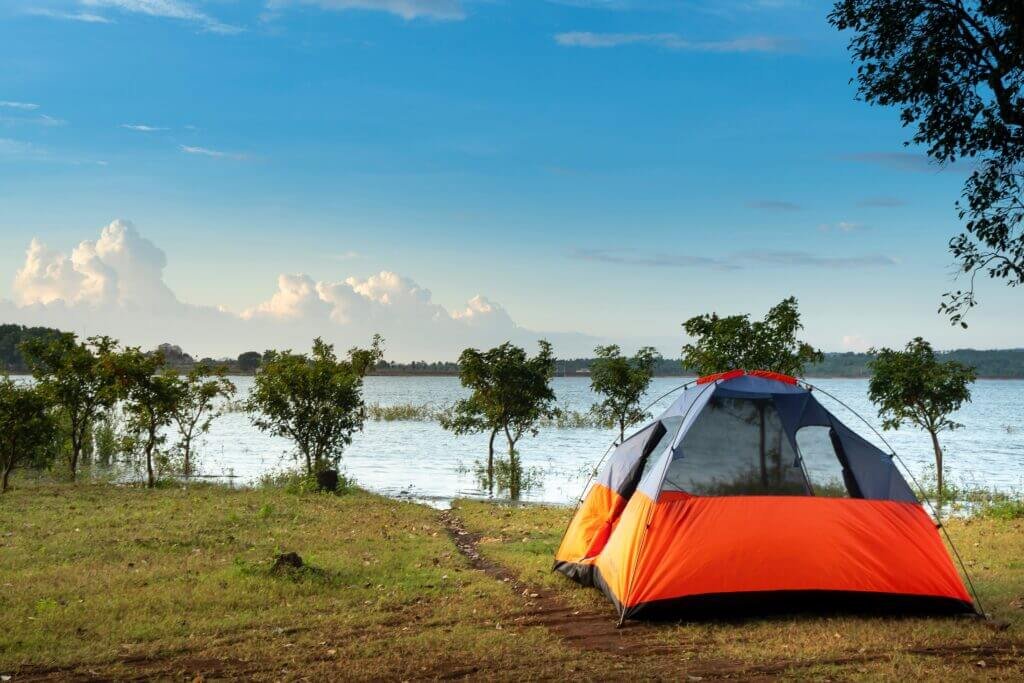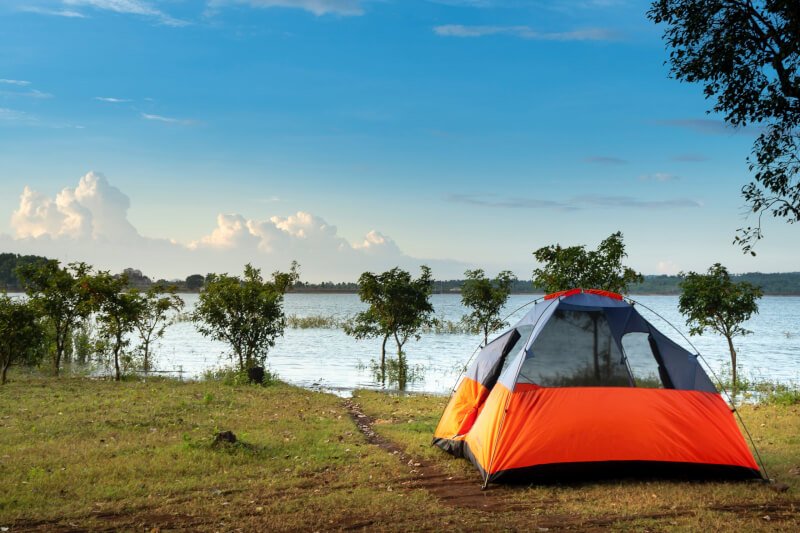Are you torn between the allure of RV camping and the simplicity of tent camping? Look no further as we explore the pros and cons of both options. Whether you prefer the comfort and convenience of RV camping or the back-to-basics experience of tent camping, this article will help you make an informed decision for your next outdoor adventure.

Cost
Initial Investment
When it comes to cost, RV camping and tent camping each have their own set of expenses. With RV camping, the initial investment can be quite high. You need to purchase or rent an RV, which can range from a basic model to a luxury motorhome, depending on your preferences and budget. On the other hand, with tent camping, the initial investment is much lower. All you need is a good quality tent, sleeping bags, and basic camping gear.
Maintenance
In terms of maintenance, RV camping requires more attention and regular maintenance compared to tent camping. RVs may require servicing, repairs, or upgrades from time to time, which can add to your overall expenses. On the other hand, tent camping requires little to no maintenance. As long as you take care of your tent and camping gear, they can last for many years without requiring any major repairs or updates.
Campsite fees
When it comes to campsite fees, RV camping tends to be more expensive than tent camping. RV campsites often charge higher fees due to the amenities and facilities they provide, such as hookups for electricity, water, and sewer. Tent camping sites, on the other hand, usually have lower fees since they offer fewer amenities. However, there are also campsites that cater specifically to tent campers and offer affordable rates.
Fuel costs
One of the major expenses associated with RV camping is fuel costs. RVs are not known for their fuel efficiency, especially larger models. The more you travel with your RV, the more you will need to spend on fuel. In contrast, tent camping does not involve any fuel costs since you rely solely on your vehicle to reach the camping destination.
Insurance
When it comes to insurance, RV camping requires additional coverage compared to tent camping. Since an RV is a valuable investment, it is essential to have insurance to protect it against accidents, theft, and damage. Tent camping, on the other hand, does not require any specific insurance coverage unless you choose to insure your camping gear separately.
Comfort
Sleeping arrangements
When it comes to sleeping arrangements, RV camping offers a more comfortable experience compared to tent camping. Most RVs come equipped with beds, mattresses, and even private sleeping areas, providing a similar level of comfort to a home. On the other hand, tent camping involves sleeping on the ground in sleeping bags or air mattresses, which may not be as comfortable for everyone.
Climate control
RV camping provides the advantage of climate control. RVs usually come equipped with air conditioning units or heating systems, allowing you to adjust the temperature inside according to your preference. This ensures a comfortable camping experience regardless of the weather conditions. Tent camping, on the other hand, relies solely on natural ventilation and insulation provided by the tent, which may not be as effective in extreme temperatures.
Amenities
RV camping offers a wide range of amenities that can enhance your camping experience. Many RVs have fully-equipped kitchens, bathrooms with hot showers, and even entertainment systems, providing all the comforts of home. Tent camping, on the other hand, requires you to rely on public restroom facilities and may not have access to amenities such as electricity or running water.
Privacy
When it comes to privacy, both RV camping and tent camping can offer varying degrees of seclusion. RV campgrounds often have designated spaces for each unit, providing a certain level of privacy. However, since RV campsites can be close together, you may still experience some noise and lack of privacy. Tent camping, on the other hand, allows you to choose secluded campsites away from other campers, providing a more intimate outdoor experience.
Flexibility
Mobility
One of the key advantages of RV camping is the mobility it provides. With an RV, you have the flexibility to travel to different campgrounds and explore various destinations without the hassle of setting up a tent each time. RVs are self-contained and allow you to bring along all your necessities, making it easy to move from one location to another. Tent camping, on the other hand, requires more time and effort in setting up and taking down your campsite every time you change locations.
Campsite availability
RV camping can sometimes be more challenging when it comes to campsite availability. RV campsites tend to fill up quickly, especially during peak seasons, and may require advance reservations. Tent camping, on the other hand, often has more availability since tents can be set up in a wider range of areas, including designated campgrounds as well as remote and backcountry locations.
Exploration options
RV camping provides you with the opportunity to explore different destinations and attractions within a given area. You can easily travel to nearby national parks, scenic routes, or popular tourist spots without having to pack and unpack your camping gear. Tent camping, however, limits your mobility to areas accessible by vehicle, or you may need to hike and backpack to reach more remote locations.
Change of plans
When it comes to flexibility in changing plans, both RV camping and tent camping have their advantages. With an RV, you have the convenience of adjusting your travel itinerary and stay duration as needed. If you encounter bad weather or decide to extend your stay at a particular location, you have the freedom to do so. Tent camping, on the other hand, allows you to be more spontaneous in choosing your camping destinations and adjusting your plans since there is no need to worry about the logistics of your camping vehicle.
Setup and Tear Down
Time required
In terms of setup and tear down time, RV camping tends to be quicker and more convenient compared to tent camping. Setting up an RV typically involves parking it in a designated spot, leveling it, and connecting any necessary utilities. Tent camping, on the other hand, requires setting up the tent, arranging camping gear, and potentially building a fire pit or cooking area, which can take more time.
Ease
RV camping is generally considered to be easier, especially for those who are new to camping. With an RV, you have a ready-to-use living space, and most of the necessary equipment and amenities are pre-installed. Tent camping, on the other hand, requires more practice and familiarity with setting up and using camping gear, although it can still be easily learned with guidance and experience.
Physical effort
When it comes to physical effort, both RV camping and tent camping require some level of exertion. RV camping involves driving and maneuvering the RV to the desired location, as well as potentially leveling and hooking up utilities. Tent camping requires more physical labor in setting up the tent, carrying camping gear, and building a fire. However, the physical effort in tent camping can also be seen as a positive aspect, as it adds to the outdoor adventure experience.

Outdoor Experience
Close to nature
Both RV camping and tent camping offer the opportunity to get close to nature. Camping in general allows you to immerse yourself in the natural environment, enjoying the beauty of the outdoors. Whether you choose to camp in an RV or a tent, you can still experience the tranquility of nature, listen to the sounds of wildlife, and witness breathtaking sunsets and starry nights.
Hiking and outdoor activities
Camping, regardless of the type, provides ample opportunities for hiking and engaging in outdoor activities. Many campgrounds are located near hiking trails, national parks, and other natural attractions, allowing you to explore the surroundings and enjoy activities such as hiking, biking, fishing, and wildlife observing. Whether you prefer RV camping or tent camping, the outdoor activities available are diverse and cater to different interests and fitness levels.
Campfire experience
Campfires are an essential part of the camping experience, providing warmth, ambiance, and a means for cooking meals. Both RV camping and tent camping allow you to enjoy the campfire experience. RVs often come equipped with fire pits or designated areas for building campfires, providing a similar experience to tent camping. However, tent camping allows you to have a more up-close and personal experience with the campfire, as you can set up your tent closer to the fire pit.
Insect and wildlife encounters
Being in the great outdoors means encountering insects and wildlife. Whether you are RV camping or tent camping, there is always a chance of encountering various animal species, from birds and squirrels to deer and even bears, depending on the location. While RV camping provides a more insulated and secure environment, tent camping allows you to be more in tune with the surrounding nature and potentially spot wildlife up close.
Storage Space
Personal belongings
RV camping generally offers more storage space for personal belongings compared to tent camping. RVs often come equipped with cabinets, closets, and compartments where you can store clothing, food, and other essentials. Tent camping, on the other hand, requires you to pack lighter and be more strategic in organizing and storing your personal belongings within the limited space of your tent.
Food and cooking equipment
RV camping provides the advantage of having a fully-equipped kitchen or cooking area, allowing you to store and prepare a wide variety of food. RVs typically have refrigerators, stovetops, and cooking utensils, making it easier to enjoy home-cooked meals even while camping. In contrast, tent camping requires you to bring portable camping stoves, coolers, and other camping-specific cooking equipment, which may have limited storage capacity.
Outdoor gear
Both RV camping and tent camping require outdoor gear such as hiking boots, backpacks, and camping chairs. However, with RV camping, you have the advantage of being able to bring along larger outdoor gear, such as bikes, kayaks, or fishing equipment, due to the extra storage capacity. Tent camping requires you to be more selective and prioritize essential outdoor gear due to the limited storage space available in your tent or vehicle.

Access to Facilities
Restrooms and showers
RV camping offers the convenience of having your own private restroom and shower within the confines of your RV. This eliminates the need to rely on public restrooms and shower facilities, providing a more comfortable and convenient experience. Tent camping, on the other hand, usually requires utilizing shared restrooms and shower facilities provided by the campground, which may vary in terms of cleanliness and convenience.
Laundry facilities
When it comes to doing laundry while camping, RV camping has the advantage. Many RV campsites offer laundry facilities where you can wash and dry your clothes. This allows you to pack fewer clothes for your camping trip and maintain cleanliness throughout your stay. Tent camping, however, requires you to either hand wash your clothes or find alternative laundry facilities nearby, which can be more time-consuming and inconvenient.
Playgrounds and swimming pools
RV campsites often provide additional amenities such as playgrounds and swimming pools, especially if they cater to families. This allows children to have more recreational options and provides a break from the traditional camping activities. Tent camping may also have access to such amenities depending on the campground, but it is less common compared to RV campsites.
Community interactions
Both RV camping and tent camping offer the opportunity to interact with other campers and be part of a camping community. RV campgrounds often have designated communal areas or social events where campers can get to know each other and share experiences. Tent camping, especially in designated campgrounds, allows you to meet fellow campers and potentially form lifelong friendships centered around the common love for camping and the outdoors.
Availability and Popularity
Campground occupancy
During peak seasons, campgrounds can experience high occupancy rates, especially in popular tourist destinations. RV campground occupancy tends to be higher compared to tent camping, as RVs provide a more all-season and comfortable camping experience. This means that if you prefer RV camping and plan to visit popular locations during peak times, you may need to make reservations well in advance to secure a spot. Tent camping, on the other hand, often has more availability and flexibility, especially in campsites that cater specifically to tent campers.
Peak season challenges
Peak seasons can present their own set of challenges for both RV camping and tent camping. Campgrounds can become crowded, leading to potential noise and crowded facilities. Additionally, popular hiking trails and attractions may also experience high foot traffic, limiting the solitude and peace that camping often offers. This is something to consider when planning your camping trip, and you may need to adjust your expectations and itinerary accordingly.
Reservation systems
RV camping often requires advance reservation systems due to the limited number of RV campsites available. Reservation systems help ensure that you have a guaranteed spot when you arrive at your desired campground. Tent camping, on the other hand, may have more flexibility in terms of reservations, allowing you to find last-minute availability or even opt for spontaneous camping trips. However, popular or highly sought-after tent camping spots may still require reservations to secure a spot.
Favorite destinations
RV camping and tent camping offer unique opportunities to explore favorite destinations. Popular RV destinations include national parks, scenic routes, and campgrounds with full amenities. RVs generally provide a more comfortable and convenient way to visit these destinations, making them a favorite among RV campers. Tent camping, on the other hand, allows you to access more remote and off-the-grid destinations, providing a more rugged and immersive outdoor experience. The favorite destinations for tent camping often include backcountry locations, wilderness areas, and secluded camping spots.

Socialization
Campground community
Both RV camping and tent camping provide opportunities for socialization and being part of a campground community. Many RV campgrounds have a strong sense of community, and campers often gather for group activities or share meals together. Tent camping, although generally more secluded, still allows you to meet fellow campers and potentially form connections with like-minded outdoor enthusiasts. The camping community, regardless of the type of camping, is known for its camaraderie and willingness to help and share experiences with one another.
Meeting fellow campers
Whether you choose RV camping or tent camping, you are likely to meet fellow campers and engage in conversations with them. Campgrounds often provide opportunities for socializing, such as communal fire pits or picnic areas. These interactions can lead to sharing experiences, exchanging travel tips, or even making new friends along the way. The camping community is known for its friendly and welcoming nature, making it a great way to connect with people from different walks of life.
Sharing experiences
One of the joys of camping is the ability to share experiences and stories with fellow campers. Whether you opt for RV camping or tent camping, you are likely to come across other campers who have interesting stories to tell or helpful information to share. These shared experiences can foster a sense of belonging and add to the overall enjoyment of your camping trip. From sharing delicious campfire recipes to exchanging recommendations for nearby attractions, the camping community is built on the foundation of sharing and learning from one another.
Environmental Impact
Carbon footprint
RV camping generally has a higher carbon footprint compared to tent camping due to the fuel consumption associated with driving and operating RVs. RVs are not known for their fuel efficiency, especially larger models, which can contribute to increased greenhouse gas emissions. Tent camping, on the other hand, has a smaller carbon footprint since it relies solely on the transportation vehicle and does not require additional fuel consumption.
Campsite conservation
Both RV camping and tent camping encourage campsite conservation and responsible outdoor practices. Campgrounds often have rules and regulations in place to ensure the preservation of natural resources and protection of wildlife habitats. Whether you are camping in an RV or a tent, it is important to follow these guidelines, such as properly disposing of waste, using designated fire pits, and minimizing noise pollution, to minimize the environmental impact.
Noise pollution
RV camping may have a higher potential for noise pollution compared to tent camping due to the close proximity of RVs in campgrounds. RVs often have generators or air conditioning units that can produce noise, and the close spacing of campsites can result in amplified noise levels. Tent camping, on the other hand, can provide a quieter and more serene experience, especially if you choose secluded camping spots away from other campers.
In conclusion, both RV camping and tent camping have their own set of pros and cons. The choice between the two ultimately depends on your preferences, budget, and desired camping experience. RV camping offers convenience, comfort, and the ability to travel with all the amenities of home, while tent camping provides a more immersive and nature-focused experience. Whether you prefer the luxury of an RV or the simplicity of tent camping, both options allow you to disconnect from the daily grind, connect with nature, and create lasting memories in the great outdoors.



